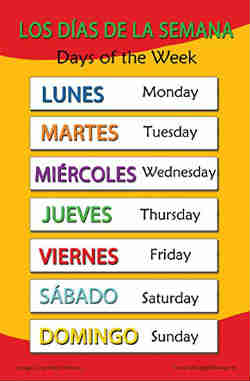The days of the week in Spanish are:
 lunes - Monday
lunes - Monday
 martes - Tuesday
martes - Tuesday
 miércoles - Wednesday
miércoles - Wednesday
 jueves - Thursday
jueves - Thursday
 viernes - Friday
viernes - Friday
 sábado - Saturday
sábado - Saturday
 domingo - Sunday
domingo - Sunday
 la semana - the week
la semana - the week
Unlike in English, the days of the week in Spanish are normally not capitalized.
Most of these names end in -es, in which cases the singular and plural forms are one and the same; for example lunes means both “Monday” and “Mondays”. Therefore, to distinguish between “on Monday” and “on Mondays”, it is necessary to use the definite article - el or los.
Tengo muchas citas el martes, pero nada el miércoles.
I have many appointments on Tuesday, but nothing on Wednesday.
Vamos a servicios religiosos los sábados o los domingos.
We go to religious services on Saturdays or on Sundays.
Sentences with lunes
Sentences with martes
Sentences with miércoles
Sentences with jueves
Sentences with viernes
Sentences with sábado
Sentences with domingo

Use of el and los with Spanish Days of the Week
The days of the week are all masculine nouns and they are not capitalized. The days miércoles and sábado have a written accent.
Lunes through viernes is the same in both singular and plural form. An “s” is added to sábado and domingo in the plural form.
el lunes - Monday
los lunes - Mondays
el martes - Tuesday
los martes - Tuesdays
el miércoles - Wednesday
los miércoles - Wednesdays
el jueves - Thursday
los jueves - Thursdays
el viernes - Friday
los viernes - Fridays
el sábado - Saturday
los sábados - Saturdays
el domingo - Sunday
los domingos - Sundays
An article is usually used with the days of the week.
No trabajo el miércoles.
I don't work Wednesday.
Hay muchas fiestas los viernes.
There are many parties on Fridays.
Note! The article is NOT used when the day is the predicate of
the verb ser =hoy es lunes
however if SER means "to happen",
the article is used "fue el sábado pasado por la tarde"-it was/happened on Saturday afternoon.
Ayer fue viernes 27 de agosto de 2009.
Yesterday was Friday, August 27th, 2009
Pasado mañana es martes 6 de julio.
The day after tomorrow is Tuesday, July 6th.
Dialogues concerning time
asking
¿Qué día es hoy? - What day is it?
¿Qué fecha es hoy? - What is today's date?
¿En qué mes estamos? - What month is it?
¿En qué año estamos? - What year is it?
¿En qué década estamos? - What decade are we in?
¿En qué siglo estamos? - What century is are we in?
responding
Hoy es sábado. - Today is Saturday.
Hoy es 10 de septiembre del 2023. - Today is September 10, 2023.
La independencia del país fue el 15 de septiembre de 1980. - The independence of the country was on September 15, 1980.
El carro es del 80. - The car is from 1980.
María nació en el 90. - Maria was born in 1990.
Ella se marchó en los años sesenta. - She left in the sixties.
En la década de los setenta la música tenía buen ritmo. - In the seventies the music had a good rhythm.
More dialogues involving time:
¿Qué día y que fecha fue ayer? - What day and date was it yesterday?
Ayer fue viernes 27 de agosto de 2009. - Yesterday was Friday, August 27th, 2009.
Hoy es domingo y es 4 de julio. - Today is Sunday, July 4th.
¿Qué día y qué fecha es pasado mañana? - What day and date is the day after tomorrow?
Pasado mañana es martes 6 de julio. - The day after tomorrow is Tuesday, July 6th.
¿En qué fecha se independizó EE.UU.? - On what date did the United States gain independence?
Se independizó el 4 de de julio de 1776. - They gained independence July 4th, 1776.
¿En qué fecha se celebra la Navidad? - On what date is Christmas celebrated?
Se celebra el 25 de diciembre. - It is celebrated December 25th.
¿Cuáles son los meses de verano en Argentina? - What are the summer months in Argentina?
Los meses de verano son: enero, febrero y marzo. - The summer months are: January, February and March.
¿En qué estación del año estamos? - What season of the year are we in?
Estamos en primavera. - We are in spring.
¿En qué año compró usted su carro? - What year did you buy your car?
¿De qué año es su carro? - What year is your car?
¿En qué año empezó a trabajar con el gobierno? - What year did you start working for the government?
Empecé a trabajar en el año 2009. - I began to work in the year 2009.
 Icon Legend
Icon Legend Help
Help Download
Download Information
Information


